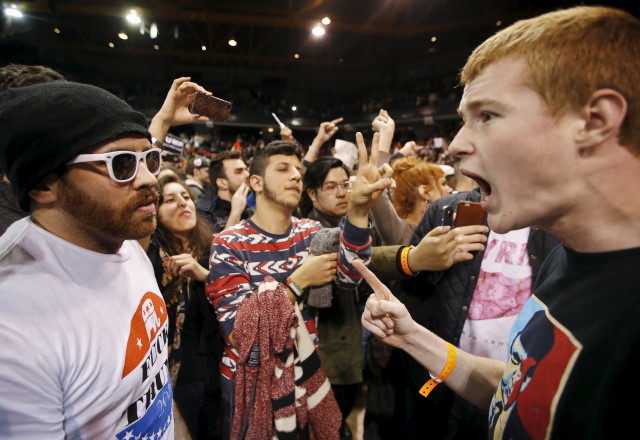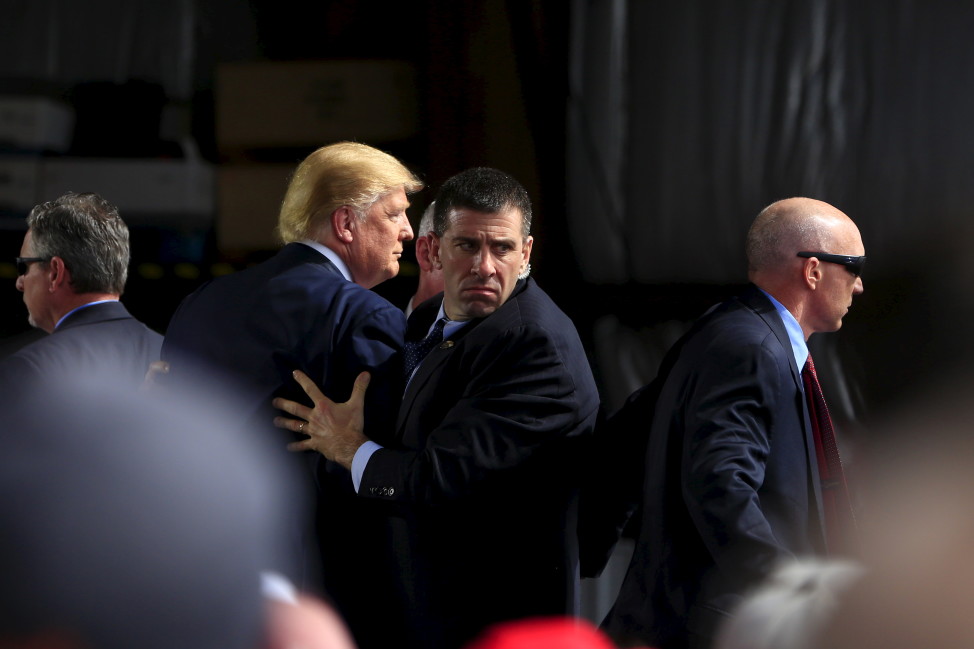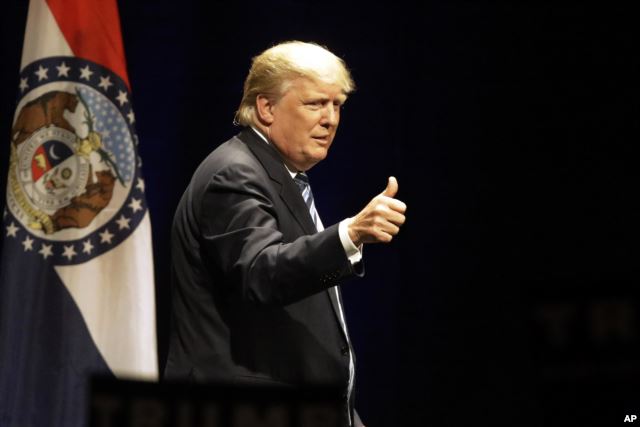Donald Trump can take that leap to presumptive Republican presidential nominee with victories in Tuesday’s primaries. But will rising tensions and violence surrounding Trump campaign events have any impact on those results — and the general election to come?

A Trump supporter (R) yells at a demonstrator (L) after Republican U.S. presidential candidate Donald Trump cancelled his rally at the University of Illinois at Chicago March 11, 2016. (Reuters)
Civil discord and acts of violence have surrounded the Trump campaign over the past few days. Wednesday a protester was sucker-punched by a Trump supporter. Friday, Trump supporters and protesters pushed, shoved and yelled at each other after a Trump rally in Chicago was cancelled due to security concerns. Saturday, Secret Service agents surrounded Trump when a protester tried to rush the stage in Dayton, Ohio.
Republican challengers Marco Rubio, Ted Cruz and John Kasich have all blamed Trump for confrontational atmosphere, as have Democratic candidates Hillary Clinton and Bernie Sanders. Trump has denied any violence at his events, saying at one point today that they’ve been “love fests.”
The question many are asking: Is Donald Trump tapping into anger that’s been festering in many Americans or is he feeding it?
The Politics of Anger
Dani Rodrik – Project Syndicate
Perhaps the only surprising thing about the populist backlash that has overwhelmed the politics of many advanced democracies is that it has taken so long. Even two decades ago, it was easy to predict that mainstream politicians’ unwillingness to offer remedies for the insecurities and inequalities of our hyper-globalized age would create political space for demagogues with easy solutions….
History never quite repeats itself, but its lessons are important nonetheless. We should recall that the first era of globalization, which reached its peak in the decades before World War I, eventually produced an even more severe political backlash….
History never quite repeats itself, but its lessons are important nonetheless. We should recall that the first era of globalization, which reached its peak in the decades before World War I, eventually produced an even more severe political backlash.

Secret Service agents surround U.S. Republican presidential candidate Donald Trump during a disturbance as he speaks at Dayton International Airport in Dayton, Ohio March 12, 2016. (Reuters)
Trumpism as a Transatlantic Phenomenon
Charlotte Cavaillé, Noam Gidron, Peter A. Hall – The American Prospect
There is a saying “some people are paranoid; I by contrast have real enemies.” Whether or not the parties seeking their votes have any genuine solutions, these people have real grievances. In that respect, it is not surprising that Trump, like most of his radical right counterparts in Europe, secures a higher proportion of his votes from people with lower levels of education and higher levels of dissatisfaction with their financial circumstances than his competitors do, and especially high proportions from older white men who are most likely to have seen the jobs they once hoped for disappear….
Current polls suggest that voters who believe that people like them have no say in what the government does are 86 percent more likely to vote for Trump than those who feel otherwise. On both sides of the Atlantic, we are seeing a massive revolt against politics as usual.
Globalization’s Broken Promise
Hilton Root & Hong Zhang – U.S. News & World Report
U.S. presidential candidates Donald Trump and Sen. Bernie Sanders have shown how easy it is to win electoral support by championing the economic grievances of globalization’s losers….
Their electoral surge caught many by surprise, because it reveals the degree of sympathy with their fundamentally disturbing message that globalization is not welcomed. It contrasts the dominant discourse of globalization, which is an uplifting and democratizing one: Not only does it help eliminate poverty in underdeveloped regions, but it helps bring about world peace. This is because, the discourse goes, countries integrated in the global economy will move closer to liberal democracy, and democratic countries don’t wage war against each other – or so the story goes….
Globalization’s most dramatic success, China, shows little progress toward democratization….
Turkey, another star performer, deviates politically from liberalization while its economy soars.

An anti-Trump protester holds his protest sign outside a rally for Republican U.S. presidential candidate Donald Trump in Cleveland, Ohio, March 12, 2016. (Reuters)
How America’s Political Decay Has Fueled Trump’s Rise
David Ignatius – The Washington Post
Here’s the puzzle: A country that is angry at “government” or “Washington” will have difficulty fixing problems that result from the breakdown of public services caused by underfunding, incompetence and the predominance of private “special” interests over the public interest. What’s needed isn’t less government, but better government — which costs money and requires good leadership….
Trump gives an angry America someone to blame: Muslims, Mexicans, government bureaucrats, free-trade negotiators, politicians, journalists. But he doesn’t begin to address the real problem of how to fix the United States’ political decay.
Trumpism: From Arab Spring to Western Winter
David Jackson – USC Center for Public Diplomacy
Republican presidential candidate Donald Trump acknowledges supporters’ applause at a campaign rally in St. Louis, Mo., March 11, 2016.
Some Americans are wondering how we’ll be able to explain Donald Trump to the rest of the world, but they needn’t worry. Trump will be an all-too-familiar character in many countries because they already have their own version of him….
Donald Trump’s call for a wall along the Mexican border and a temporary ban on Muslim immigrants wouldn’t raise an eyebrow in this crowd. Hungarian Prime Minister Viktor Orban has already erected fences along Hungary’s borders with Serbia, Croatia, and Slovenia to keep migrants out, and he recently threatened to build one along the border with Romania too


